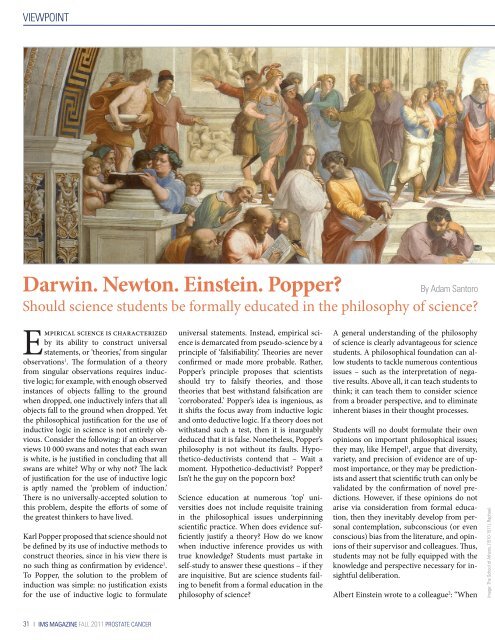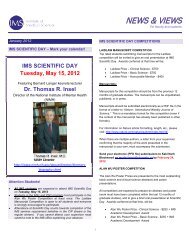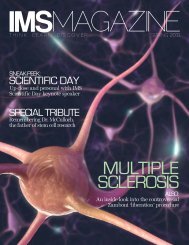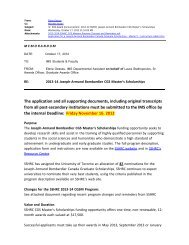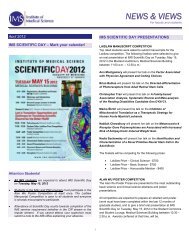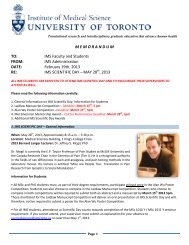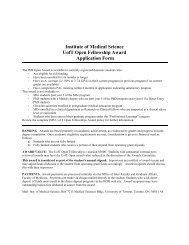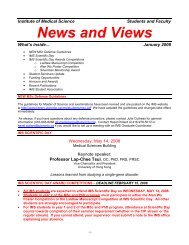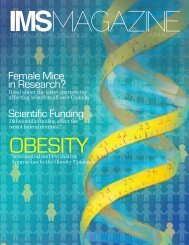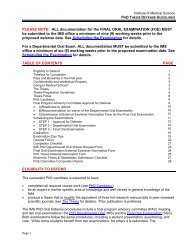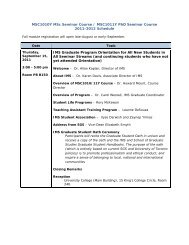Fall 2011 - Institute of Medical Science - University of Toronto
Fall 2011 - Institute of Medical Science - University of Toronto
Fall 2011 - Institute of Medical Science - University of Toronto
Create successful ePaper yourself
Turn your PDF publications into a flip-book with our unique Google optimized e-Paper software.
VIEWPOINT<br />
Darwin. Newton. Einstein. Popper?<br />
By Adam Santoro<br />
Should science students be formally educated in the philosophy <strong>of</strong> science?<br />
Empirical science is characterized<br />
by its ability to construct universal<br />
statements, or ‘theories,’ from singular<br />
observations 1 . The formulation <strong>of</strong> a theory<br />
from singular observations requires inductive<br />
logic; for example, with enough observed<br />
instances <strong>of</strong> objects falling to the ground<br />
when dropped, one inductively infers that all<br />
objects fall to the ground when dropped. Yet<br />
the philosophical justification for the use <strong>of</strong><br />
inductive logic in science is not entirely obvious.<br />
Consider the following: if an observer<br />
views 10 000 swans and notes that each swan<br />
is white, is he justified in concluding that all<br />
swans are white? Why or why not? The lack<br />
<strong>of</strong> justification for the use <strong>of</strong> inductive logic<br />
is aptly named the ‘problem <strong>of</strong> induction.’<br />
There is no universally-accepted solution to<br />
this problem, despite the efforts <strong>of</strong> some <strong>of</strong><br />
the greatest thinkers to have lived.<br />
Karl Popper proposed that science should not<br />
be defined by its use <strong>of</strong> inductive methods to<br />
construct theories, since in his view there is<br />
no such thing as confirmation by evidence 1 .<br />
To Popper, the solution to the problem <strong>of</strong><br />
induction was simple: no justification exists<br />
for the use <strong>of</strong> inductive logic to formulate<br />
universal statements. Instead, empirical science<br />
is demarcated from pseudo-science by a<br />
principle <strong>of</strong> ‘falsifiability.’ Theories are never<br />
confirmed or made more probable. Rather,<br />
Popper’s principle proposes that scientists<br />
should try to falsify theories, and those<br />
theories that best withstand falsification are<br />
‘corroborated.’ Popper’s idea is ingenious, as<br />
it shifts the focus away from inductive logic<br />
and onto deductive logic. If a theory does not<br />
withstand such a test, then it is inarguably<br />
deduced that it is false. Nonetheless, Popper’s<br />
philosophy is not without its faults. Hypothetico-deductivists<br />
contend that – Wait a<br />
moment. Hypothetico-deductivist? Popper?<br />
Isn’t he the guy on the popcorn box?<br />
<strong>Science</strong> education at numerous ‘top’ universities<br />
does not include requisite training<br />
in the philosophical issues underpinning<br />
scientific practice. When does evidence sufficiently<br />
justify a theory? How do we know<br />
when inductive inference provides us with<br />
true knowledge? Students must partake in<br />
self-study to answer these questions – if they<br />
are inquisitive. But are science students failing<br />
to benefit from a formal education in the<br />
philosophy <strong>of</strong> science?<br />
A general understanding <strong>of</strong> the philosophy<br />
<strong>of</strong> science is clearly advantageous for science<br />
students. A philosophical foundation can allow<br />
students to tackle numerous contentious<br />
issues – such as the interpretation <strong>of</strong> negative<br />
results. Above all, it can teach students to<br />
think; it can teach them to consider science<br />
from a broader perspective, and to eliminate<br />
inherent biases in their thought processes.<br />
Students will no doubt formulate their own<br />
opinions on important philosophical issues;<br />
they may, like Hempel 1 , argue that diversity,<br />
variety, and precision <strong>of</strong> evidence are <strong>of</strong> upmost<br />
importance, or they may be predictionists<br />
and assert that scientific truth can only be<br />
validated by the confirmation <strong>of</strong> novel predictions.<br />
However, if these opinions do not<br />
arise via consideration from formal education,<br />
then they inevitably develop from personal<br />
contemplation, subconscious (or even<br />
conscious) bias from the literature, and opinions<br />
<strong>of</strong> their supervisor and colleagues. Thus,<br />
students may not be fully equipped with the<br />
knowledge and perspective necessary for insightful<br />
deliberation.<br />
Albert Einstein wrote to a colleague 2 : “When<br />
Image: The School <strong>of</strong> Athens, (1510-1511), Raphael.<br />
31 | IMS MAGAZINE FALL <strong>2011</strong> PROSTATE CANCER


